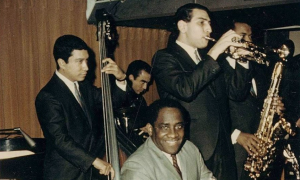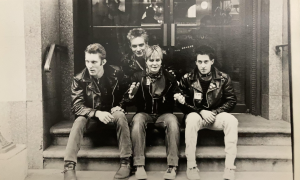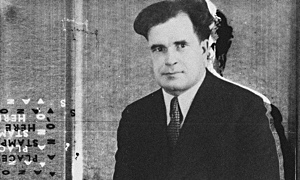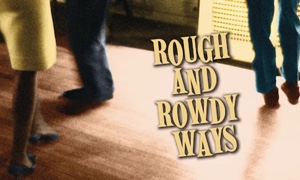Home » Jazz Articles » Hardly Strictly Jazz » Back To... SOUL
Back To... SOUL
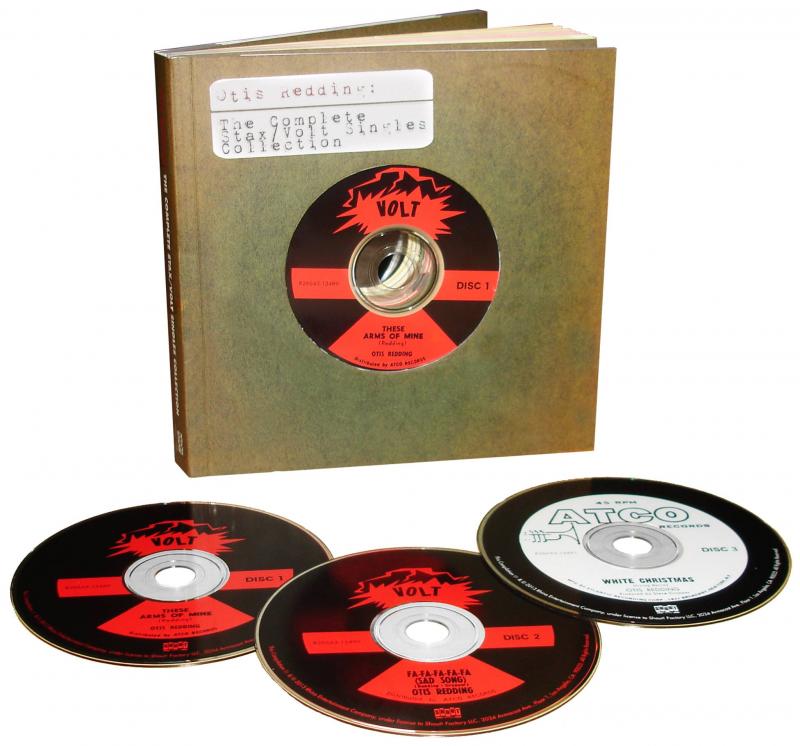 There are three this summer that stand out from the pack. The first is an anthology so obvious that I wonder why it hadn't been offered until now—Otis Redding: The Complete Stax/Volt Singles Collection (Shout Factory, 2013), a three-disc package with a 7x7 color book that presents the A and B sides of one of the most formidable and influential bodies of work the sixties can boast. There's always a lot of talk about what Otis Redding might have accomplished had he lived, and I personally find this sort of Monday morning quarterbacking to be, well, stupid. We'll never know, and frankly even the most gifted artists of that generation too often fared not so well as the seventies marched by. What we in fact do know is what Redding left us, and the singles do in fact represent him better than his albums did.
There are three this summer that stand out from the pack. The first is an anthology so obvious that I wonder why it hadn't been offered until now—Otis Redding: The Complete Stax/Volt Singles Collection (Shout Factory, 2013), a three-disc package with a 7x7 color book that presents the A and B sides of one of the most formidable and influential bodies of work the sixties can boast. There's always a lot of talk about what Otis Redding might have accomplished had he lived, and I personally find this sort of Monday morning quarterbacking to be, well, stupid. We'll never know, and frankly even the most gifted artists of that generation too often fared not so well as the seventies marched by. What we in fact do know is what Redding left us, and the singles do in fact represent him better than his albums did. Redding's core chemistry was something of a distillation of Little Richard, Sam Cooke, and James Brown, but also something very different than that. The sound of the black church had found its way to black popular music by 1950, so that was nothing new. But Redding's 1962 Stax debut, "These Arms Of Mine," posessed a dark sophistication within its testimonial. And it also had the slow-burning Stax house band matching his intensity, and with this a major career was launched. Singles puts together his complete 45 rpm output, in the original mono, and for the few who don't know what the fuss is about, all is revealed. Redding's pressure cooker delivery was versatile and worked with ballads, up-tempo material, and all things in between. He knew from pathos, and could instantly transform other people's hits—"Satisfaction," "Papa's Got A Brand New Bag," "My Girl"—unapologetically into full-blown Redding vehicles.
This said, he understood his own style, so he was more prone to go deep than wide. At his most effective, Redding was a soul shouter who could rearrange your emotions in three minutes. Singles is to date the best Redding collection, not only because the mono sounds like a stampede coming out of your speakers, but because it's all the stuff you want in one place, wrapped in a record geek coffeetable book (of full color photo repro's of the original 45 rpm records).
While on the subject of Stax, we forward to 1973, six years after Redding perished in a plane crash. Stax was not just a label, but also a studio, and its use was not restricted to artists who cut for the label.
The idea of Elvis Presley cutting at Stax represents a kind of obvious marketing synergy. Everytime The King recorded in Memphis, he brought his fastball with him, as if he sought to remind everyone he was the hometown royalty. The less interesting fact is that it was more a convenience to have him recording close to home. Despite the dilettante's wisdom that Presley was past his prime by this point, what we have is Memphis' most signature-bearing talent since WC Handy fronting a band that blended members of his touring band with the local studio hotshots, a near perfect batch of material, and a level of focus and energy he would never again sustain in the studio. The Deluxe Edition (there's a master takes only version as well) of Elvis At Stax (RCA/Legacy, 2013)—which I bought—gathers the masters and a revealing selection of outtakes, and not only do we hear one of the great singers at his last great peak (backed by a paint-peelingly hot band), but we get a sense of how surely he guided the evolution of his recordings (when he cared enough, which wasn't always the case, as it is here).
The biggest hit to emerge from these sessions was "I've Got a Thing about You Baby," written by Tony Joe White (who gave us "Rainy Night In Georgia"). "Thing" was—prior to this session—a single former Sun rockabilly Billy Lee Riley had out on the Entrance label, a small imprint distributed by CBS Records. Riley's version was a little Memphian jewel, produced by Chips Moman (who had produced Presley's previous Memphis sessions, at American in 1969, which yielded "Suspicious Minds," among other classics). Frankly, all Presley had to do was faithfully cover Billy Lee, and it would have been a decent day's work. They accomplished as much in just a few takes, but kept working at it for fifteen finished takes, the last of which is a true masterpiece of country soul that takes the tune a few layers deeper than Billy Lee Riley may have ever sensed he could have. Throughout, the alternate Presley takes from Stax are formidable, but the finished takes are the stuff of legend, with "Thing About You" likely being the best of a thrilling bunch.
 But not every artist got to be Presley, nor was every label Stax. The Omnivore label is run by obsessives who seem quite content to comb the states for obscure soul treasures, and their GPS is working quite fine. The South Side Of Soul Street (Omnivore, 2013) collects all the singles released from 1967-76 by the Minaret label of Valparaiso, AL, not far from Tuscaloosa. While nothing they did ever made any kind of national impact, they were something of a mini-Stax, with their own in-house musicians, songwriting, and a homegrown crop of vocal talent on par with anything of the decade. South Side is largely a sampler of hits that should have been. There's an album's worth of stuff on here by South Carolina-born Big John Hamilton, who started out as a guitarist (playing in the road bands of no less than Etta James and Hank Ballard and the Midnighters) but whose vocal talents eclipsed his playing. His 1969 soul take on "Before The Next Teardrop Falls" (which would five years later become Freddy Fender's signature country hit) is a gem, wrought with pitch-perfect pathos. Hamilton's a perfect gutbucket soul singer, just not a famous one.
But not every artist got to be Presley, nor was every label Stax. The Omnivore label is run by obsessives who seem quite content to comb the states for obscure soul treasures, and their GPS is working quite fine. The South Side Of Soul Street (Omnivore, 2013) collects all the singles released from 1967-76 by the Minaret label of Valparaiso, AL, not far from Tuscaloosa. While nothing they did ever made any kind of national impact, they were something of a mini-Stax, with their own in-house musicians, songwriting, and a homegrown crop of vocal talent on par with anything of the decade. South Side is largely a sampler of hits that should have been. There's an album's worth of stuff on here by South Carolina-born Big John Hamilton, who started out as a guitarist (playing in the road bands of no less than Etta James and Hank Ballard and the Midnighters) but whose vocal talents eclipsed his playing. His 1969 soul take on "Before The Next Teardrop Falls" (which would five years later become Freddy Fender's signature country hit) is a gem, wrought with pitch-perfect pathos. Hamilton's a perfect gutbucket soul singer, just not a famous one. Other Minaret artists such as Johnny Dynamite, Genie Brooks, and the Double Soul each made fantastic singles for the label, all collected here. But none of these artists had the luck that came to so many other regional soul singers who enjoyed even temporary stardom during this golden era of soul. The label's standard of quality was uniformly high, and this two disc set never gets tired.
So, in a nutshell, that's how I spent my summer vacation. I promise to be incisive in the future, but this season, I wrote music for Sesame Street, ate pork chops and listened to rhythm 'n' blues.
< Previous
Love & Peace: The Music of Harold Parlan
Comments
Tags
Otis Redding
Hardly Strictly Jazz
Skip Heller
United States
Little Richard
Sam Cooke
James Brown
Elvis Presley
Etta James
For the Love of Jazz
 All About Jazz has been a pillar of jazz since 1995, championing it as an art form and, more importantly, supporting the musicians who create it. Our enduring commitment has made "AAJ" one of the most culturally important websites of its kind, read by hundreds of thousands of fans, musicians and industry figures every month.
All About Jazz has been a pillar of jazz since 1995, championing it as an art form and, more importantly, supporting the musicians who create it. Our enduring commitment has made "AAJ" one of the most culturally important websites of its kind, read by hundreds of thousands of fans, musicians and industry figures every month.






